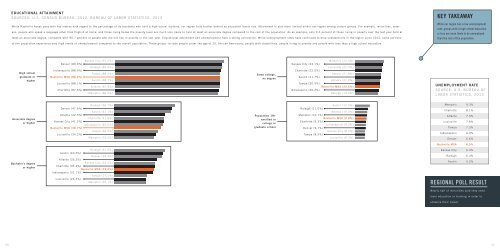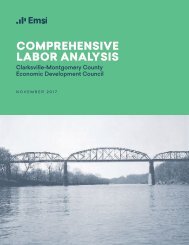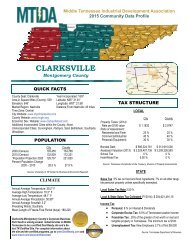o_19l9j223vvmv2drsq2158817sia.pdf
You also want an ePaper? Increase the reach of your titles
YUMPU automatically turns print PDFs into web optimized ePapers that Google loves.
EDUCATIONAL ATTAINMENT<br />
SOURCES: U.S. CENSUS BUREAU, 2012; BUREAU OF LABOR STATISTICS, 2013<br />
While Nashville keeps pace with key metros with regard to the percentage of its residents who hold a high school diploma, our region falls further behind as education levels rise. Attainment is also more limited within our region among certain groups. For example, minorities, veterans,<br />
people who speak a language other than English at home, and those living below the poverty level are much less likely to hold at least an associate degree compared to the rest of the population. As an example, only 9.3 percent of those living in poverty over the last year held at<br />
least an associate degree, compared with 90.7 percent of people who did not live in poverty in the last year. Educational attainment and unemployment have a strong correlation. While unemployment rates have continued to drop substantially in the region since 2012, some portions<br />
of the population experience very high levels of unemployment compared to the overall population. These groups include people under the age of 25, African Americans, people with disabilities, people living in poverty and people with less than a high school education.<br />
KEY TAKEAWAY<br />
While our region has a low unemployment<br />
rate, groups with a high school education<br />
or less are more likely to be unemployed<br />
than the rest of the population.<br />
High school<br />
graduate or<br />
higher<br />
Denver (89.9%)<br />
Indianapolis (88.9%)<br />
Nashville MSA (88.2%)<br />
Louisville (88.1%)<br />
Charlotte (87.6%)<br />
Kansas City (91.2%)<br />
Raleigh (89.9%)<br />
Tampa (88.3%)<br />
Austin (88.1%)<br />
Atlanta (87.8%)<br />
Memphis (86.2%)<br />
Some college,<br />
no degree<br />
Kansas City (23.1%)<br />
Charlotte (22.0%)<br />
Austin (21.7%)<br />
Tampa (20.9%)<br />
Indianapolis (20.2%)<br />
Memphis (24.4%)<br />
Louisville (22.3%)<br />
Denver (21.8%)<br />
Atlanta (21.0%)<br />
Nashville MSA (20.6%)<br />
Raleigh (19.0%)<br />
UNEMPLOYMENT RATE<br />
SOURCE: U.S. BUREAU OF<br />
LABOR STATISTICS, 2013<br />
Associate degree<br />
or higher<br />
Denver (47.6%)<br />
Atlanta (42.3%)<br />
Kansas City (41.2%)<br />
Nashville MSA (38.7%)<br />
Louisville (34.2%)<br />
Raleigh (50.7%)<br />
Austin (47.1%)<br />
Charlotte (41.6%)<br />
Indianapolis (40.0%)<br />
Tampa (36.3%)<br />
Memphis (33.2%)<br />
Population 18+<br />
enrolled in<br />
college or<br />
graduate school<br />
Austin (12.5%)<br />
Raleigh (11.0%)<br />
Atlanta (10.3%)<br />
Memphis (10.1%)<br />
Nashville MSA (9.8%)<br />
Charlotte (9.3%)<br />
Indianapolis (9.2%)<br />
Denver (9.1%)<br />
Kansas City (8.5%)<br />
Tampa (8.5%)<br />
Louisville (8.3%)<br />
Memphis<br />
Charlotte<br />
Atlanta<br />
Louisville<br />
Tampa<br />
Indianapolis<br />
Denver<br />
9.3%<br />
8.1%<br />
7.9%<br />
7.8%<br />
7.3%<br />
6.9%<br />
6.6%<br />
Nashville MSA<br />
6.5%<br />
Bachelor’s degree<br />
or higher<br />
Raleigh (42.0%)<br />
Austin (40.5%)<br />
Denver (39.9%)<br />
Atlanta (35.3%)<br />
Kansas City (33.5%)<br />
Charlotte (33.4%)<br />
Nashville MSA (32.6%)<br />
Indianapolis (32.1%)<br />
Tampa (27.1%)<br />
Louisville (26.5%)<br />
Memphis (26.1%)<br />
Kansas City 6.4%<br />
Raleigh 6.4%<br />
Austin 5.2%<br />
REGIONAL POLL RESULT<br />
Nearly half of minorities said they need<br />
more education or training in order to<br />
advance their career.<br />
56<br />
57












